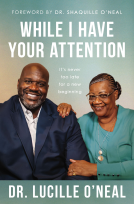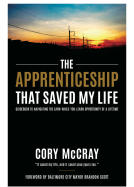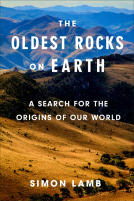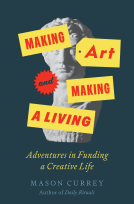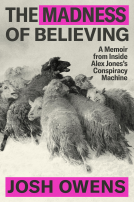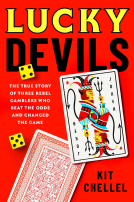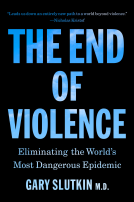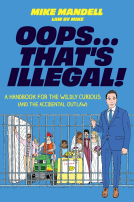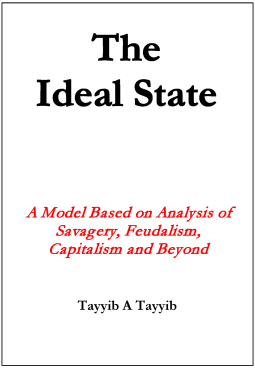
The Ideal State
A Model Based on Analysis of Savagery, Feudalism, Capitalism and Beyond
by Tayyib A Tayyib
This title was previously available on NetGalley and is now archived.
Send NetGalley books directly to your Kindle or Kindle app
1
To read on a Kindle or Kindle app, please add kindle@netgalley.com as an approved email address to receive files in your Amazon account. Click here for step-by-step instructions.
2
Also find your Kindle email address within your Amazon account, and enter it here.
Pub Date Dec 15 2020 | Archive Date Sep 15 2024
Description
Have you not wondered what kind of a country you would want to live in? What policies of its government would guarantee a secure and happy life for you and your children? All civilized states and societies are moving towards more and more socialism and democratic control of their governments, despite temporary setbacks. What do you think lies ahead?
In this work, you would find a comprehensive analysis of the violent and abusive past the previous generations of our species have had and the development of socio-economic and political systems from the age of savagery to feudalism and capitalism. You would find why, and how, capitalism leads to extreme exploitation, imperialism and violence, why it needs to be discarded and why a democratic socialist future for mankind is not only possible but is inevitable. The author outlines the political structure and socio-economic policies of an ideal state that would ensure security and well-being of all its citizens and would co-exist, peacefully, with other states. This is what our generation and those in the past have always dreamed about.
Numerous illustrations are included and many political thinkers, economists and political leaders have, indirectly, contributed to this work. Quotations from their works are included on specific issues.
Imagine what such an ideal state, or states, would mean for you and for the rest of humanity. Find out how humanity is progressing in this direction now and how this process would accelerate in the future. Let us not give up hope. The future of humanity is bright!
A Note From the Publisher
Advance Praise
A socialist author explores the intersection of history, violence, and economics in this nonfiction work.
More than 2,000 years ago, Plato's seminal Republic centered on what an ideal society would look like. In this work, Tayyib hopes to provide a revised version of Plato's vision, based on humanity's subsequent actions and the development of political science as an academic discipline. In its ideal form, per the author, political science is a "science of sciences" that not only blends the qualitative nature of humanities and history with the quantitative analysis of social sciences but is also informed by the scientific study of human behavior and evolution. Indeed, much of the book is a survey of the totality of human history from an interdisciplinary perspective, beginning with the evolution of Homo sapiens and early tribalism and continuing through the development of socio-economic structures over centuries and into the present. Central to the book's argument is a challenge to the traditional demarcation between a prehistoric "age of savagery" and an "age of civilization" that began 6,000 years ago. To the author, many of the hallmarks of supposed social order—from feudalism to modern capitalism—demonstrate the "continuing savagery" of eras defined by colonialism, warfare, and the exploitation of the weak. Drawing heavily from Marxist analysis—the book is dedicated, in part, to Karl Marx, Leon Trotsky, Mao Zedong, and Vladimir Lenin—Tayyib places blame squarely on the so-called elites of society.
Although much of the book offers a standard Marxist interpretation of the ruling class exploiting the masses, its strength lies in its accessible style, which eschews the sort of academic jargon that's characteristic of leftist theoretical analysis. Indeed, the author notes his hesitancy in using the word elite (which he believes serves "to glorify them"), instead opting for more jarring terminology, such as the exploiter class. Still, the author doesn't resort to mere attacks on capitalist strawmen, instead offering a nuanced survey that, for example, distinguishes between the "Intensive Capitalism" of ideological purists such as Adam Smith and the "Benevolent Capitalism" of liberals such as Franklin D. Roosevelt. The book's generally negative view of the past as "a history of violence" belies its ultimate conclusion that, given humanity's evolutionary impulses toward sympathy and compassion, the world will "inevitably become" a more democratic, socialist place "ruled by the people themselves." Even if one doesn't agree with the book's ideological propositions, it's an undeniably well-researched work, backed by an array of scholarly endnotes as well as the author's personal observations as a Pakistani citizen who's seen the legacy of colonialism, war, and economic exploitation firsthand. Although the volume's length of more than 400 pages is a bit daunting—as are most books that attempt to examine the totality of human existence—the author does a good job of balancing his scholarly approach with an easy-to-grasp narrative that's accompanied by more than 50 maps, photos, charts, graphs, and other visual elements.
A thoroughly researched, definitively leftist, and ambitious interpretation of humankind's past and future. - "Kirus Reviews"
Marketing Plan
This book is on sale on Amazon.com.
This book is on sale on Amazon.com.
Available Editions
| EDITION | Ebook |
| ISBN | 9781735459165 |
| PRICE | $18.00 (USD) |
| PAGES | 460 |
Available on NetGalley
Average rating from 6 members
Featured Reviews
 Mike M, Media/Journalist
Mike M, Media/Journalist
This was an excellent book. This is a thoughtful, well-researched book about what an ideal government should be about. Every government official should read it, as well as every voter.
 Skip Q, Reviewer
Skip Q, Reviewer
This may be the most important book I have ever read. Of course I rate it very highly. It is an extensive review of how states have been governed in the past and leaves it to the reader to make his own choices of what kind of a system is worth pursuing. I thank the author for a review copy of this book.
This book is preaching to the choir, in terms of my belief the author is onto something good in his negative assessment of capitalism.
But, for four hundred pages, the prose is a lot like the synopsis above. That is to say, it's not fluid and readable like Yannis Varoufakis and Thomas Piketty (as translated by Arthur Goldhammer, anyway) are. I'm not in good conscience able to recommend the read to laypeople. If you're interested in leftist economics and social policy, come to the altar, but check your expectations at the door.
 Leonardo Z, Reviewer
Leonardo Z, Reviewer
Review of The Ideal State – 5/5
Few books manage to be both intellectually stimulating and deeply relevant to modern society, but The Ideal State achieves just that. With a masterful blend of philosophy, political theory, and ethical discourse, this book challenges readers to reconsider their fundamental beliefs about governance, justice, and the nature of an ideal society.
One of the most compelling aspects of The Ideal State is its ability to present complex ideas in a clear and engaging manner. The author navigates historical and contemporary theories, drawing from the works of Plato, Aristotle, Rousseau, and modern thinkers, while crafting a fresh and insightful perspective of their own. The prose is both accessible and profound, ensuring that readers from all backgrounds—whether seasoned scholars or those new to political philosophy—can appreciate the arguments being made.
The book is structured in a way that naturally guides the reader through essential questions: What defines an ideal state? Is justice more important than freedom? Can a government truly balance equality and efficiency? Each chapter introduces a new angle on these themes, building upon previous discussions while avoiding redundancy. This thoughtful organization makes The Ideal State not just an academic text, but a compelling narrative of political thought.
A particular strength of the book lies in its ability to remain neutral while exploring competing ideologies. Rather than advocating a single, rigid perspective, the author presents various viewpoints fairly, allowing readers to form their own conclusions. This open-ended approach makes the book a powerful tool for discussion and debate, rather than a mere exposition of one person’s beliefs.
Moreover, The Ideal State does not shy away from applying its theories to real-world issues. From the role of democracy in modern society to questions of wealth distribution and social justice, the book remains firmly grounded in reality. The inclusion of historical case studies and contemporary examples enhances its relevance, making it more than just a philosophical exploration—it is a guide to understanding the world we live in today.
Overall, The Ideal State is a thought-provoking, well-researched, and engaging work that deserves a place on the shelf of anyone interested in philosophy, politics, or the pursuit of a better society. A true masterpiece in its field.
Readers who liked this book also liked:
Scott Michael LeRette
Biographies & Memoirs, Christian, Parenting, Families, Relationships
